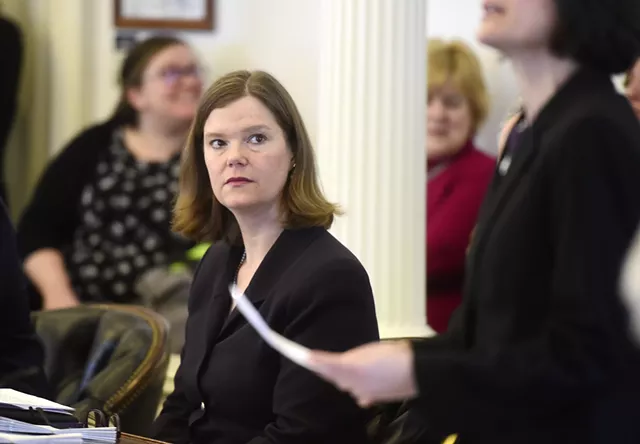With an already-extended legislative session nearing its end, the Vermont Senate on Friday evening passed an education reform bill after several days of political wrangling. There was no roll call but the bill appeared to have passed along party lines, with Democrats voting for it and Republicans against.
The bill closely resembles one passed in the House, with some key amendments. The Senate had spent weeks creating its own version, but abandoned it on Thursday after it became clear the measure had insufficient support to pass.
In recent days, superintendents and other school officials from across the state had also spoken out forcefully against the Senate version.
School Leaders Speak Against Ed Reform Bill Ahead of Vote

School Leaders Speak Against Ed Reform Bill Ahead of Vote
By Alison Novak
Education
The bill now heads back to the House, and then to a conference committee — composed of three members each from the House and Senate — that will hammer out a compromise between the two versions.
It’s unclear whether Gov. Phil Scott will sign the bill. In a written statement on Friday evening, he said he “still cannot accept either the House or Senate versions.
“I do however remain optimistic about finding a path forward with the committee of conference,” Scott wrote. “As I’ve said since the beginning of this process, I will only accept a final product that costs less than it does today, sets us on a clear path to achieve scale, reduces administrative overhead, and eliminates inefficiencies that prevent money from flowing towards more opportunities for students.”
To get a bill passed on Friday evening took days of closed-door meetings, discussions, writing and rewriting.
At a Democratic caucus the day before, Senate President Pro Tempore Phil Baruth (D/P-Chittenden-Central) expressed urgency at getting legislation across the finish line. The governor, Baruth said, had told him he would call the legislature back into session if they adjourned without passing an education reform bill.
“Let’s face it,” he said. “The clock has run out.”
Baruth told senators that he would make a procedural motion to return to the House legislation, which he described as a “strong” and “viable” bill with “all the bells and whistles” that was “carefully and diligently produced.” Then, he said, senators could make changes to the House bill by introducing amendments.
At Thursday’s caucus, Sen. Ruth Hardy (D-Addison) was ready with her own comprehensive amendment, which retained much of the House language but made a number of key changes. Hardy has been a vocal critic of the Senate version of the bill and and voted against it as a member of the Finance Committee.
But some Democratic colleagues took issue with certain aspects of Hardy’s amendment, which prevented it from coming to the floor on Thursday. Hardy worked with Sen. Seth Bongartz (D-Bennington), chair of the Education Committee, later that day and into Friday to strike a compromise.
The Hardy-Bongartz amendment was presented to the Democratic caucus at 2:30 p.m. on Friday, ahead of a 4 p.m. floor session.
With Little Enthusiasm, Senate Finance Committee Advances Ed Reform Bill

With Little Enthusiasm, Senate Finance Committee Advances Ed Reform Bill
By Alison Novak
Education
The amendment retains the House’s base foundation formula amount of $15,033 — with strings attached. The formula would go into effect on July 1, 2029, but only if new school districts have been created and are operational by that time. The amendment also orders a new study aimed at creating a more refined foundation formula that would include tiered weights for different categories of students who are learning English and those with disabilities. That formula could eventually replace the one in the bill.
Both the House and Senate versions call for a redistricting committee that would meet this summer and into the fall to come up with recommendations for new school district boundaries to consider by next year.
The Hardy-Bongartz amendment changed the qualifications for members of the committee. Instead of being comprised solely of legislators, as in the Senate bill, the committee would include experts in geographic mapping and education data analysis; the education secretary; representatives from the Vermont School Boards Association, Vermont Superintendents Association, Vermont Association of School Business Officials and Vermont Association of Planning and Development Agencies; the chair of the Commission on the Future of Public Education; and two legislators.
The redistricting committee is tasked with coming up with three proposals for school districts with not more than 8,000 preK-12 students each by November of this year. Once the legislature creates new school district boundaries, the bill calls for the formation of “transitional school boards” made up of members of current boards. These boards would help create new school districts and make new voting wards. Though new school districts would be formed by July 1, 2026, they would not used until July 1, 2029 — when the foundation formula goes into effect.
Both the foundation formula and the new statewide property tax rate would be phased in over four years to provide a smoother transition. In lieu of the current property tax credit for low-income homeowners, the bill creates a property tax exemption for homeowners who have an annual income up to $100,000.
The bill restores the House’s provision for average class-size minimums, though they are slightly lower: 10 students in kindergarten and first grade, 12 students in third through fifth grade, 15 students in sixth through eighth grade, and 18 students for high school. It scraps the statewide graduation requirements and school calendar that were in the House bill. But it would create a school construction program, which is described in both the House and Senate versions of the bill.
Under the legislation, public dollars can go to independent schools as long as 25 percent or more of its students are publicly tuitioned. And it prohibits tuitioning to independent schools outside of Vermont.
The bill calls for the creation of 12 regional assessment districts to allow property appraisals to be done in a more timely manner — a provision that would go into effect at the beginning of 2030.
Some Lawmakers Want to Revamp How Real Estate Is Assessed as Part of Vermont’s Education Funding Transformation

Some Lawmakers Want to Revamp How Real Estate Is Assessed as Part of Vermont’s Education Funding Transformation
By Rachel Hellman
Politics
On the floor on Friday evening, Sen. Tanya Vyhovsky (P/D-Chittenden-Central) and Sen. Scott Beck (R-Caledonia) both introduced several additional amendments that failed.
“I will say that we have given Vermonters and our colleagues in the House a bit of a show over the last couple of days,” Baruth said. “But what we have really shown is that you underestimate the Vermont Senate at your peril.”
The legislature is expected to adjourn in early June.

